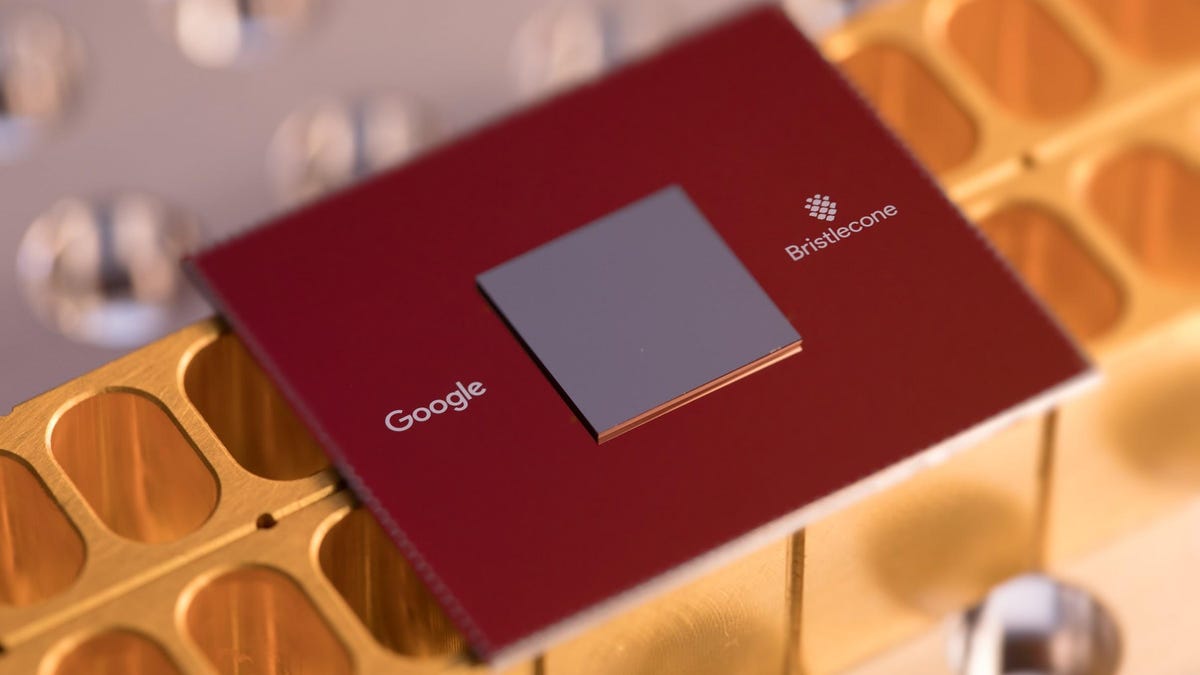Google says Bristlecone chip could ignite quantum computing
Google's quantum computing effort takes a big step forward, and the company thinks a prototype could outdo conventional machines in some tasks.
Google has a quantum computer chip, called Bristlecone, and the company thinks it'll outdo the classical computers using today's silicon processor designs.
Quantum computers, which stand to revolutionize at least part of the computing industry if anybody can ever figure out how to get them working, are benefiting from heavy investments at Google, IBM, Microsoft, Intel, D-Wave and others. Google detailed some of its plans Monday in a blog post about Bristlecone.
For one thing, Google research scientist Julian Kelly said, the Bristlecone quantum computing chip has 72 qubits, the weird memory cells that endow quantum computers with their ability to store an immensely wide range of combinations of ones and zeros. For another, it should be able to outdo Google's earlier 9-qubit device when it comes to the essential technology of quantum error correction, which is key to keeping hypersensitive qubits from getting perturbed.
"We are cautiously optimistic that quantum supremacy can be achieved with Bristlecone," Kelly said, referring to the point at which a quantum computer can outpace a classical machine.
Conventional computer chip designs are running out of steam, with dwindling performance improvements and increasing difficulty when it comes to delivering next-generation designs. Quantum computing is one ray of hope for the industry, though it's not yet clear how hard engineering and programming such chips will be or exactly what computing tasks they'll be good for.
But one analyst firm, Communications Industry Researchers, thinks quantum computing is mature enough to declare it big business in the future. CIR estimates quantum computing revenue will increase from $1.9 billion in 2023 to $8 billion by 2027.
Some adventurous companies have signed up. Samsung, Daimler, Honda, JP Morgan Chase and Barclays became IBM quantum computing customers in 2017, though even customers are to some degree participating in research projects with today's quantum computing maturity.
Quantum computers rely on the hard-to-grasp physics rules that prevail at very small scales. One phenomenon, called superposition, means that a single qubit can simultaneously be in two states, one and zero, and that groups of linked qubits can quickly outpace conventional computing bits. A collection of eight conventional bits, for example, can store a single one of the 256 possible combinations of ones and zeros. Eight qubits, though, can store all 256 at the same time.
That architecture, good for simultaneously evaluating many possibilities, at least in principle, is famously well-suited to cracking today's encryption technology. But that's not likely to be quantum computing's big breakthrough, in part because researchers are working on quantum-proof encryption algorithms, Google believes.
Instead, quantum computing will be good for physics and chemistry simulations impossible with classical computers, and useful for developing new drugs, solar panels and other materials. Financial services companies, too, will be able to use quantum computing to manage investment portfolios.
And closer to Google's own wheelhouse, quantum computing could be good for artificial intelligence chores like self-driving cars , optimizing warehouse operations or setting e-commerce product prices.
Blockchain Decoded: CNET looks at the tech powering bitcoin -- and soon, too, a myriad of services that will change your life.
Tech Enabled: CNET chronicles tech's role in providing new kinds of accessibility.


